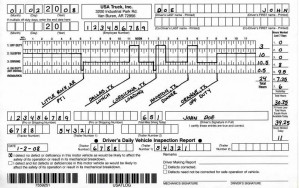The American Trucking Association filed a legal challenge to the Transportation Department’s new rules:
The American Trucking Associations, based in Arlington, Virginia, filed a petition today challenging the regulation at the U.S. Court of Appeals in Washington. The group cited the Hobbs Act, a U.S. law that “prohibits actual or attempted robbery or extortion affecting interstate or foreign commerce,” according to the Justice Department’s criminal resources manual.
We cannot allow this rulemaking, which was fueled by changed assumptions and analyses that do not meet the required legal standards, to remain unchallenged.
“We cannot allow this rulemaking, which was fueled by changed assumptions and analyses that do not meet the required legal standards, to remain unchallenged,” Bill Graves, president and chief executive officer of the American Trucking Associations, based in Arlington, Virginia, said in a statement today.
While the final rule maintained an 11-hour limit on truckers’ driving day, instead of shortening it to 10 hours as proposed, the industry objects to a requirement of a 34-hour rest period each week that would require drivers to be off two consecutive nights, said Sean McNally, a spokesman for the trucking group.
Many more fatalities and injuries are caused by speeding than fatigue, making the department’s focus on driving hours misplaced, the group said in its statement. The industry supports regulations that would require installation of speed- limiting devices on trucks, the group said.
Werner Enterprises Inc. (WERN) and C.R. England are among trucking companies that have objected to a government requirement that the weekly time off include the periods between 1 a.m. and 5 a.m. on two consecutive days. Trucking companies describe the rest as a restart because it resets drivers’ weekly limits of time on duty.
The trucking regulator underestimated the cost of the restart requirement, McNally said. It will reduce flexibility and may undermine safety by forcing drivers onto the road during rush hour, he said.
The original proposal by the Federal Motor Carrier Safety Administration required two 12 a.m. to 6 a.m. rest periods during the restart. Groups such as Advocates for Highway and Auto Safety had argued that loopholes in previous rules let drivers average 82 hours of work in seven days when they were supposed to be limited to 60 hours.
The trucking regulator is also facing criticisms from safety groups and the International Brotherhood of Teamsters union for sticking with the 11-hour driving maximum. The government was sued in 2003, 2006 and 2009 for allowing 11-hour driving shifts. The third lawsuit was settled with an agreement that FMCSA would redo the regulation.
There were 3,675 truck-related fatalities in 2010, up 8.7 percent from 3,380 in 2009, according to preliminary data from the National Highway Traffic Safety Administration. As recently as 2006, there were 5,027 fatalities.
Trucking Industry Challenges U.S. on Driver Rest Rules – Bloomberg
